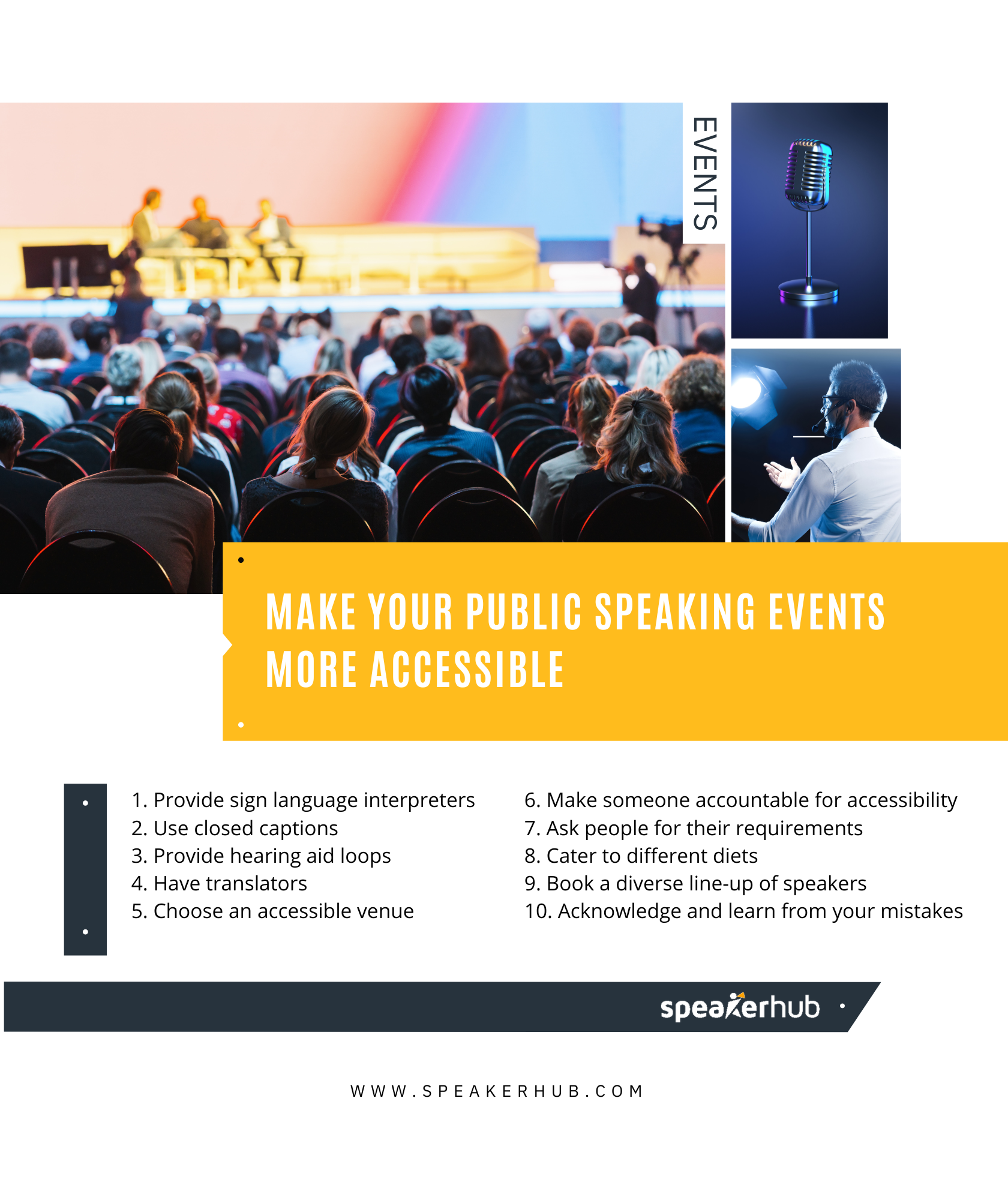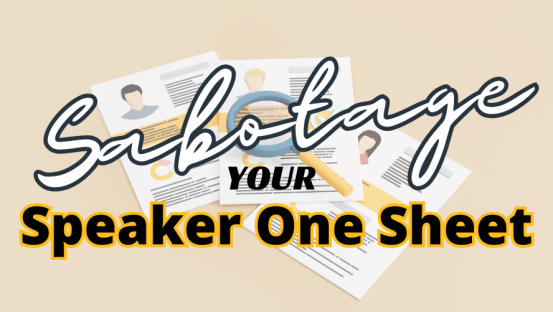How to Make Your Public Speaking Events More Accessible

Accessibility is a hot topic at the moment, and with good reason. As event organizers and public speakers, we have an obligation to people to make our events as accessible as possible so that more people can enjoy them.
The key thing about accessibility is that we need to go out of our way to think about people from all walks of life. We need to consider everything from people’s ages and religions to whether they have physical or mental impairments that need addressing.
There’s a lot of ground to cover, so let’s get started. Here are ten of our top tips for making your public speaking events as accessible as possible.

1. Provide sign language interpreters
This is one of the more common things that we see, especially at large-scale events. The idea is to provide an interpreter who can translate a talk into sign language in real-time for the benefit of people in the audience who are deaf or hard of hearing. In recent years, a number of these sign language reporters have gone viral for their energetic interpretations of, for instance, lyrics at rap concerts, showing us that it’s not just public speaking events that are turning to sign language interpreters.
2. Use closed captions
Closed captions are basically like subtitles, and they can be created in advance for any recorded material to make it more accessible for those with hearing difficulties. It’s harder to do this in real-time, but as you’ll have seen if you’ve ever turned subtitles on for a live stream or broadcast, it’s definitely possible. Sure, the captioning isn’t always perfect, but it’s better than nothing and new technologies like AI and natural language processing are getting better and better at creating this kind of captioning.
3. Provide hearing aid loops
Hearing aid loops are also called audio induction loops, and they're essentially a bespoke type of sound system that are designed to help people who use hearing aids. It essentially sends out a wireless signal that hearing aids can pick up to boost audio signals and make it easier for people with hearing difficulties to understand what’s being said.
4. Have translators
Having translators in place is essential if you’re planning an international event where not everyone is going to speak the same language. These days, most events couple real-time translation with audio headsets that visitors can use. They can then switch between tracks and hear real-time translations in a variety of languages.
5. Choose an accessible venue
There’s an art and a science to choosing the right venue, and you’ll want to spend some time thinking about the kinds of visitors that you’re going to welcome to your event as well as what their needs are likely to be. For example, if you know that you’re going to have people in wheelchairs, you’re not going to want somewhere with a lot of stairs. If any of your visitors have prosthetic limbs and there’s a metal detector at the entrance, make sure that the staff know to expect them.
6. Make someone accountable for accessibility
If no one’s in charge of accessibility, it will end up being an afterthought as opposed to an important driver of your programming decisions. That’s why it’s a good idea to put a specific employee in charge of accessibility, with clear cut goals so that you can monitor their performance and ensure that they’re getting the job done. Many larger organizations have full-time employees who only focus on accessibility, but if you’re a smaller company, just add it to a suitable employee’s responsibilities.
7. Ask people for their requirements
One of the best ways to figure out what you need to do to make your event more accessible is to ask people for what they need. You can do this by sending out an email to everyone who’s bought a ticket and linking them to a survey where they can share their needs. You can also simply ask them to email you or push an update out on your social media platforms to ask them for their thoughts. Even better, give registrants the opportunity to identify their needs as part of the registration process.
8. Cater to different diets
If you’re providing food and drink at your event, bear in mind that different people follow different diets or have special dietary needs. You’ll want to ensure that you have alternative milks in place for hot drinks, as well as a choice of vegetarian, vegan and halal meals. As above, it can help to ask people in advance for their dietary requirements so that you can better cater for them. This will also give you an idea of the quantities of each required so that you don’t overspend.
9. Book a diverse line-up of speakers
One great way to ensure that you’re running a diverse event is to ensure that your speakers are as diverse as your attendees. People love to see their own demographics reflected by the speakers they’re listening to, and booking a diverse line-up of speakers comes with other benefits such as exposing your attendees to a range of different ideas that come from a global perspective.
10. Acknowledge and learn from your mistakes
The thing about diversity is that nobody is perfect and none of us gets everything right the first time. The important thing is to try our best, and acknowledge and learn from our mistakes so that we don’t repeat them in the future.
Conclusion
Now that you know a few of our top tips on how you can make your public speaking events more accessible, you’re in a better place to start putting some of these tips into practice.
Of course, we’d love to hear how you get on and whether you have any tips and tricks of your own, so be sure to let us know your thoughts in the comments so that we can keep the discussion going.
You can also follow us on your favorite social networking sites for more. We’ll see you soon for another article!





